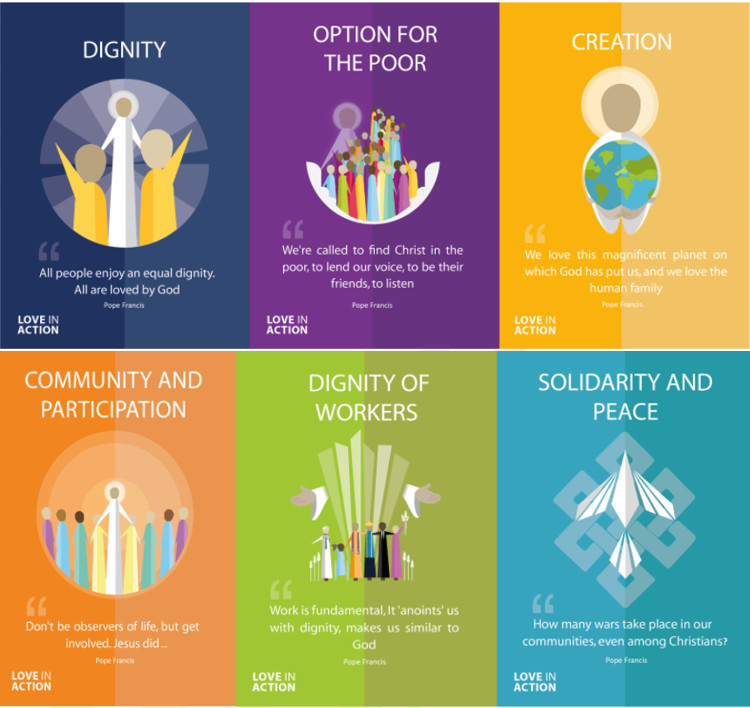Catholic Social Teaching

Catholic Social Teaching at St Michael & St Martin School
Catholic Social Teaching is based on the belief that God has a plan for creation: a plan to build a kingdom of peace, love and justice. Catholic Social Teaching includes insight from the Scriptures, as well as understanding from the thinking, reflections, and lived experience of Christian leaders throughout the life of the Church.
As we learn and grow, we believe that God has a special place in his plan for every single one of us, whoever we are. Our part in this plan involves every aspect of our lives, from the things we pray about, to how we live as a responsible global citizen. We are all called to love God and to love our neighbours in every situation, especially our sisters and brothers living in poverty. Following in the footsteps of Christ, we hope to make the kingdom of God present in our unjust and broken world.
The six principles of Catholic Social Teaching are woven through everything that we do at school, through the curriculum, special events and activities and through our ordinary actions in school.
These six principles guide us on how to live out our faith in the world.

In KS1 and KS2, we use the Caritas ‘Rooted in Love’ programme to support our teaching of Catholic Social Teaching. We focus on a different theme every half-term. 'Rooted in Love' was developed in partnership with the Diocese of Westminster Education Service. It addresses the objectives relating to Catholic Social teaching from the new Religious Education Directory, including prayer and liturgy ideas around each theme as well as suggestions for bringing this work to life in the Catholic life and mission of the school.

In Early Years we use the resources from ‘Caritas in Action’ to support our teaching. Caritas in Action provides a unique cross-curriculum approach for embedding the principles of Catholic Social Teaching. It seeks to engage young people of all ages in expressing their faith through social justice and action.
Our Chaplaincy Team , have led Catholic Social Teaching Collective Worship sessions to different classes in KS2 using the Rooted in Love resources.

As Christians, we are called to live in community with one another.
This means being active members of the world we live in. We need to remember the dignity of all people, support one another and recognise how our gifts and talents could be used to help others. We are called to look out for those around us and help them however we can.
‘You shall love the Lord your God with all your heart, and with all your soul, and with all your mind. This is the first and greatest commandment. And the second is you shall love your neighbour as yourself.’
Matthew 22:37-39

We are created by God with dignity, and we live in a community together. God did not just create us but the whole of the world, and we must live in harmony with the whole of his Creation. How we have treated and continue to treat the Earth affects us now and will affect people in the future.
‘Creation is a gift, it is a wonderful gift that God has given us, so that we care for it and we use it for the benefit of all.’
Pope Francis, Laudato Si’

Treating someone with dignity means treating them with love, kindness and fairness.
Everyone should be treated with dignity because God made and loves everyone.
Everyone has different gifts and talents.
We are amazing, just the way God made us.
We are all extraordinary, just the way we are.
It is important to remember that those around us have special gifts and talents too.
' Every person is immensely holy and deserves our love.’
Pope Francis, Joy of the Gospel

Peacemakers are people who dedicate their lives and work to making the world more Peaceful. They help reconcile people with God and with one another.
Solidarity means to stand up for each other.
If we stand up for and speak out on behalf of those in need in our world, we can make the world a fairer and more peaceful place.
‘Live in harmony with one another. Do not be proud, but associate with those in need.’
Romans 12:16

The ‘preferential option’ means allowing someone to have the first choice. It means giving someone the best that is available; not just the scraps or leftovers.
"Charity has the power to change reality; it is a genuine force for change in history."
Pope Leo, Dilexi te
In the Gospels, Jesus shows a preferential option for the poor by putting them first. He gives them special importance by thinking of their needs and helping them have their rightful place in the world.
In his exhortation Dilexi te, Pope Leo writes that preference for the poor “never indicates exclusivity or discrimination towards other groups which would be impossible for God... Wanting to inaugurate a kingdom of justice, fraternity and solidarity, God has a special place in his heart for those who are discriminated against and, he asks us, his Church, to make a decisive and radical choice in favour of the weakest.”
‘Looking at his disciples, he said: ‘Blessed are you who are poor, for yours is the kingdom of God. Blessed are you who hunger now, for you will be satisfied. Blessed are you who weep now, for you will laugh.’
Luke 6:20-21

Dignity of Workers is about everyone finding a role in society, finding something they are good at, and feeling important and needed because of that. Most people will have a job at some point in their lives.
Work is more than simply being able to earn money. It is about being able to support ourselves and our families.
Dignity of Workers is also about making sure that people’s dignity is respected in work.
‘Out of the ground, the Lord God caused to grow every tree that is pleasing to the sight and good for food . . . . Then the Lord God took the man and put him into the garden of Eden to work it and keep it’
Genesis 2:9,15
